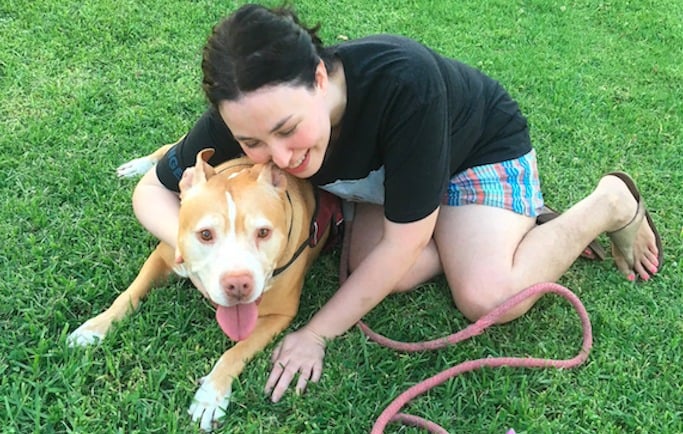Delta’s Pit Bull Service Dog Ban is Disability Discrimination: Here’s What You Need to Know
Defying disability rights, scientific fact and public outcry, Delta Airlines has prohibited pit bull-type service dogs on their flights. As of July 10th, any person with a disability who attempts to bring a pit bull-type service dog on a Delta flight will be turned away. Given that a pit bull is not a singular breed of dog but a body type — which technically includes four different breeds but has subjectively come to mean any muscular dog with a big head and short, sleek fur (weighing anywhere from twenty five to one hundred pounds) — countless members of the disability community will be affected.
According to Marjie Alonso, executive director of the International Association of Animal Behavior Consultants, pit bulls have an ideal body type for supporting anyone who needs help standing up. Because of their stocky build, pit bull-type dogs provide a solid brace to hold onto, making them ideal service dogs.
Anyone with a disability who uses a pit bull-type service dog — and anyone in the disability community who wishes to stand by those who do — deserves to know the facts. Starting with the reasoning behind Delta’s pit bull ban. According to Delta’s press release, “the changes follow an 84 percent increase in reported incidents involving service and support animals since 2016, including urination/defecation, biting and even a widely reported attack by a 70-pound dog.”
The most glaring problem with Delta’s statement is the omission that the “widely reported attack by a 70-pound dog” was not a pit bull-type dog, but a Chocolate Lab and Pointer mix (neither of which breed has been banned). Delta has also said two flight attendants were recently bitten by an emotional support animal identified as a pit bull-type dog. However, given that only one incident is said to have involved a pit bull-type dog — of the “84 percent increase in reported incidents” — it is clear that pit bull-type service dogs (and in turn, the disabled people requiring them) are being unnecessarily discriminated against.
This is not to minimize the incident said to involve a pit bull-type dog, only to put it into perspective. The majority of dog bites don’t break the skin, with a whopping 81% causing either no injury at all or injury too minor for medical treatment. Since the details of the bites involving the pit bull-type dog were not included in the press, they likely fall into the “no injury” category, as it is a known fact that bites by pit bull-type dogs receive mainstream press attention, while fatal bites by other breeds go widely unreported.
Speaking of Delta’s pit bull ban from a legal perspective, attorney Rebecca Wisch told the Washington Post: “I expect some sort of challenge by disability advocates, because this poses freedom of travel challenges for those that rely on service dogs who are pit bull-type dogs or those of mixed breed that simply look like pit bulls.”
Regina Lizik, who works at Animal Farm Foundation, which trains pit bull-type shelter dogs to become service dogs, says: “First and foremost, it’s about people. Delta is discriminating against people. When Delta or anyone puts out a regulation like this that dictates what kind of dog can be a service dog, they are reducing access for someone with a disability.”
Like Fiona Gilbert, whose pit bull-type service dog Koda helps her with mobility issues caused by a neurological condition. Gilbert has limited sensation and extreme numbness on the right side of her body. She relies on Koda to put pressure on her right foot and leg as she walks so she can feel where they are. Delta’s pit bull ban would not allow Gilbert to travel with the help of Koda, even though the U.S. Department of Transportation released a statement asserting that “A limitation based exclusively on breed of the service animal is not allowed under the department’s Air Carrier Access Act regulation.” This calls into question the legality of Delta’s pit bull ban. For many, however, the damage is already done.
Zero definitive data exists to support the widespread myth that pit bull-type dogs are any more dangerous or aggressive than other dogs. Pit bull-type dogs score better in temperament evaluations than almost every other type of dog, according to the American Temperament Test Society. Bans like Delta’s give the false impression that pit bulls are to be feared — and discriminate against people with disabilities who require pit bull-type service dogs to have a decent quality of life.
About Rooted In Rights
Rooted in Rights exists to amplify the perspectives of the disability community. Blog posts and storyteller videos that we publish and content we re-share on social media do not necessarily reflect the opinions or values of Rooted in Rights nor indicate an endorsement of a program or service by Rooted in Rights. We respect and aim to reflect the diversity of opinions and experiences of the disability community. Rooted in Rights seeks to highlight discussions, not direct them. Learn more about Rooted In Rights




Thank you for speaking out about this discrimination against pit bull type dogs. This kind of thing gives artillery to those misguided folks who take aim at these animals because of inaccurate reporting. It’s so much easier to lay blame than to actually fact check these reports. Do we dare include this kind of thing in the “fake news” category? And look who pays the price; the dogs for sure, but also those who love and depend on their life-improving, life-saving, service animals.
Thank you, Janice, for reading my article and for your thoughtful and intelligent comment. Inaccurate reporting has led to unconscionable consequences for pit bull-type dogs. Mainstream publications have, since the 1970s, cited all kinds of completely unfounded and beyond biased “studies” — the details of which could be an entirely new article. Imagine if I just decided one day that ketchup was evil, wrote it up in a “study” without doing any research, and then hundreds of thousands of people quoted me as though it were true. Not to mention that fear sells articles and the media helps perpetuate that fear by only reporting on and picking up stories that stoke fears based on stereotypes and lies. You bring up a very good point about “fake news” because what’s real is now considered fake and what’s fake is now considered real. Facts, unfortunately, don’t sell. Which is being capitalized on right now in the most obscene way. You are completely right: It’s so much easier to blame than to actually fact check. So many times, “pit bull attacks” reported in the news end up not even being perpetuated by a pit bull-type dog (does a basset hound really look anything like a pit bull?) and the corrections are never made. Because of this, pit bull-type dogs are the most abused type of dog in America. And now it’s not just the dogs suffering, but the people who rely on them to live their lives. Countless pit bull-type service dogs improve the lives of their disabled humans in monumental ways. Delta’s ban on pit bull-type service dogs is WRONG on so many levels. As a disabled person with a loving pit bull — as well as a human with a conscience — I am appalled at the discrimination.
Discrimination is discrimination. We would think it crazy — and illegal — if Delta banned particular brand of wheelchair because a flight attendant was injured when stowing a single device. If Delta wants to ban a particular dog, ie Buffy, the misbehaved golden retriever whose bite sent a flight attendant to the ER, so be it. To ban an entire breed? To harm the lives if disabled people who depend on canine companions for safe travel? This should be illegal. Until then, I hope all travelers will protest with their wallets and book fights on airlines that do not discriminate against anyone, including the disabled and their four-footed friends. Thank you, Brijana Prooker, for thoroughly researching this issue and helping to improve the lives of disabled people and their pit bull-type companions.
Yes, I hope people will protest with their wallets by choosing not to fly Delta, which discriminates against disabled people and their pit bull-type service dogs. I hope everyone will do their research and book flights on airlines that do not discriminate. You are absolutely right: discrimination is discrimination, plain and simple. The facts of Delta’s pit bull service dog ban are so outrageous that it’s hard to believe it could even be — but that’s how I feel about so many injustices happening in the world today. It’s sickening. Thank you for your kind and thoughtful comment. I wish I didn’t have to write this article because I wish the discrimination against pit bull-type dogs and their disabled humans didn’t exist. But until it ceases to exist, I will keep speaking up for pit bull-type dogs and for disability rights.
Yes, I hope people will protest with their wallets by choosing not to fly Delta, which discriminates against disabled people and their pit bull-type service dogs. I hope everyone will do their research and book flights on airlines that do not discriminate. You are absolutely right: discrimination is discrimination, plain and simple. The facts of Delta’s pit bull service dog ban are so outrageous that it’s hard to believe it could even be — but that’s how I feel about so many injustices happening in the world today. It’s sickening. Thank you for your kind and thoughtful comment. I wish I didn’t have to write this article because I wish the discrimination against pit bull-type dogs and their disabled humans didn’t exist. But until it ceases to exist, I will keep speaking up for pit bull-type dogs and for disability rights.